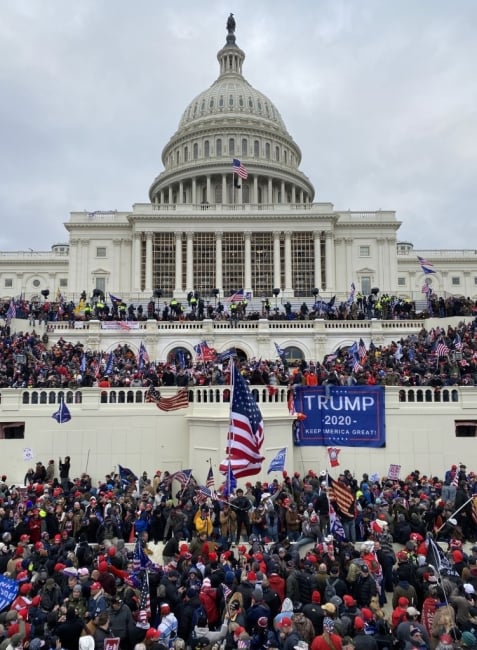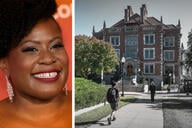You have /5 articles left.
Sign up for a free account or log in.

Supporters of President Trump surround the U.S. Capitol.
Anadolu Agency via Getty Images
In 1978, Harvey Milk, the first openly gay politician elected to public office, gave what has come to be known as “The Hope Speech.”
He began by saying, “Unless you have dialogue, unless you open the walls of dialogue, you can never reach to change people’s opinion.” On Wednesday, we saw the failure of dialogue and, by that failure, the failure of American democracy. At the same time, close to a half million Americans will die from COVID-19. In my own county of Los Angeles, one person is infected every 10 seconds today.
I appreciate that many college leaders spoke out to condemn the desecration of the U.S. Capitol. David Wilson, president of Morgan State, rightly called the actions “an attempted coup.” Michael Roth, president of Wesleyan University, continued his admirable comments about the past four years by acknowledging that fascists are among us and working from the fascist playbook to destroy democracy.
What troubles me, however, is that higher education as a system seems to be a bystander to the assault on democracy. The National Association of Manufacturers released a statement first urging Congress to certify the election of President-elect Biden and then condemning the “armed thugs” who entered the Capitol. The Business Roundtable made similar statements.
I have never looked to the National Association of Manufacturers for guidance about the structure of democracy. I have never thought the Business Roundtable was particularly amenable to individuals such as President-elect Biden. Nevertheless, their statements were admirable and garnered a good deal of commentary. I do not doubt that the vast majority of us in higher education reacted with horror, shame and disgust at the events that transpired because of Trump’s call for armed insurrection. Change, however, has to begin with a meaningful dialogue about what our role has been in enabling the events that have occurred. The echo chamber of Facebook where our friends like what we write and we like what they write gives us a sense that we are at least voicing our contempt for those who wish to destroy democracy. We must do more.
Immediately -- today -- the American Council on Education as well as its affiliates must call for the impeachment or removal of President Trump by the invocation of the 25th Amendment. Our disciplinary associations must do the same. I appreciate that higher education’s tendency is to deliberate and come to thoughtful, nuanced decisions about a problem. That time has long since passed with regard to Trump. We have enabled him for too long, and the result is what we saw Wednesday. It is time for higher education as a social organization whose very purpose is a commitment to the search for truth and the advancement of democracy to state unequivocally that Trump must go.
We then need an urgent meeting of leaders in higher education about the role of fomenting and securing democracy. Our campuses, even while we are consumed with the pandemic and horrific budget shortfalls, have to recommit ourselves to thinking about what actions we can take to ensure that the events of this week never occur again.
Democracy is an idea founded on the belief that through dialogue we will reach understanding and a decision about the way forward. The fundamental purpose of our colleges and universities is to model how to have difficult dialogues and what viable solutions to particular problems might be based on facts.
Too often, we have retreated to our ivy-covered campuses. We are certainly busy, even more so during the pandemic. Many of us also are thoughtful commentators and vital researchers. We definitely need historians explaining the history of constitutional constructs such as the Electoral College. We need social scientists who can work through how the founders could write so eloquently those historic lines of democracy, “We hold these truths to be self-evident,” while at the same time Blacks were enslaved.
Who could argue that the researchers working on vaccines for this dreaded disease are not performing admirably in rapid time? And yet I can’t help but feel that, as a sector, we in higher education do not get high grades for protecting and advancing democracy. At the end of Milk’s address 42 years ago, he spoke about how difficult and frightening life could be for gay kids who received a drumbeat of misinformation about what it meant to be gay. He said, “You have to give them hope. Hope for a better world, hope for a better tomorrow.”
Ultimately, democracy is about providing hope and enabling a better tomorrow. The heart of enabling hope is higher education, through fact, argumentation and preparation for participation in civic -- and civil -- dialogue.




